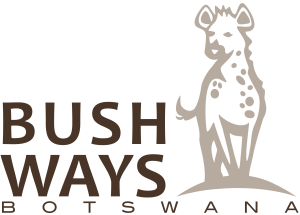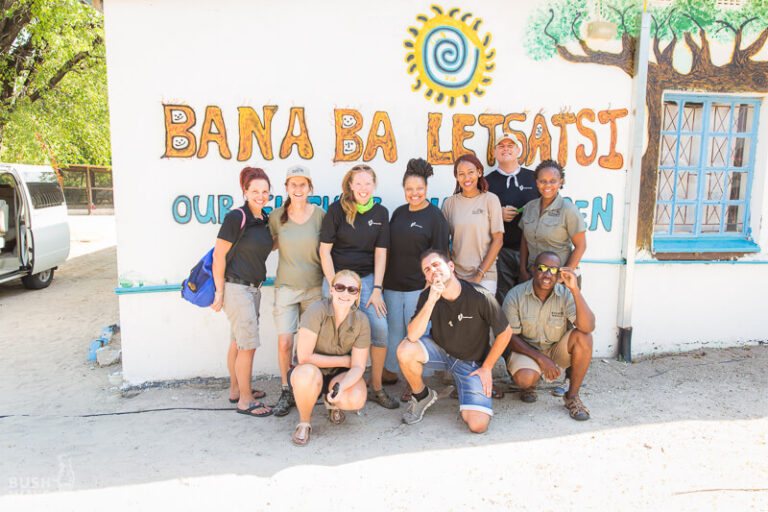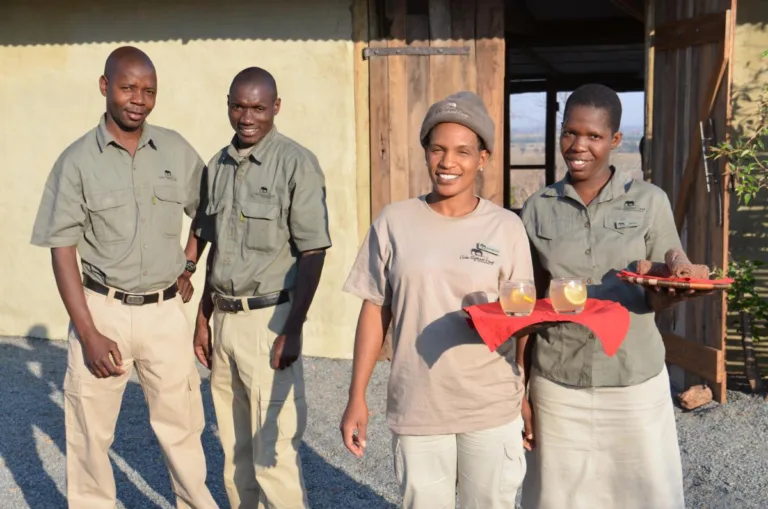Sango Safari Camp is located in one of the most unique Wildlife Areas in Botswana – on the banks of the Khwai River, close to the border of the Moremi Game Reserve. Developing and managing a Lodge in such a delicate area, remaining ‘green’ and reducing one’s carbon-footprint is of the utmost importance to us and the least we can do to contribute to the conservation of this incredible wilderness.
 The environmental and the climatic conditions found in this area are very sensitive – first and foremost the need to reduce high pollution materials, such as concrete, had lead us to the idea to use renewable timber and canvas for the rooms and dining area. The only permanent structure you will find in camp is the kitchen, which was already in existence before we developed the site.
The environmental and the climatic conditions found in this area are very sensitive – first and foremost the need to reduce high pollution materials, such as concrete, had lead us to the idea to use renewable timber and canvas for the rooms and dining area. The only permanent structure you will find in camp is the kitchen, which was already in existence before we developed the site.
 All the furniture used in the camp is handmade and sourced either from renewable commercial timber plantations in South Africa or from scrap wood found locally. Hence we are not using any hardwoods – one of the main factors why major parts of the rainforests are being cut down. All the decks for the Canvas tents come from a special program called “Working for Water” in South Africa where harmful exotic trees are being removed from sensitive wetland environments. To reduce long transportation’s of material and to employ people from the local community, we handcrafted the furniture in camp mainly by ourselves.
All the furniture used in the camp is handmade and sourced either from renewable commercial timber plantations in South Africa or from scrap wood found locally. Hence we are not using any hardwoods – one of the main factors why major parts of the rainforests are being cut down. All the decks for the Canvas tents come from a special program called “Working for Water” in South Africa where harmful exotic trees are being removed from sensitive wetland environments. To reduce long transportation’s of material and to employ people from the local community, we handcrafted the furniture in camp mainly by ourselves.
 The electricity for both the camp and the staff village comes entirely from our own solar powered system, enabling us to be independent from the use of Government electricity. All the hot water used is generated in Solar Geysers and our own above ground sewerage treatment plant ensures that no pollutants enter into the underlying water table and surrounding marshes as well the river. The entire waste which is produced at Sango Safari Camp is separated carefully and some of it will be recycled. In order to alleviate the waste problem in Khwai we are transporting all the separated garbage to Maun to a special waste disposal plant.
The electricity for both the camp and the staff village comes entirely from our own solar powered system, enabling us to be independent from the use of Government electricity. All the hot water used is generated in Solar Geysers and our own above ground sewerage treatment plant ensures that no pollutants enter into the underlying water table and surrounding marshes as well the river. The entire waste which is produced at Sango Safari Camp is separated carefully and some of it will be recycled. In order to alleviate the waste problem in Khwai we are transporting all the separated garbage to Maun to a special waste disposal plant.
Careful planning of all logistics and the correct supply of Eco-friendly products for the camp is another core factor we consider when it comes to reducing the carbon footprint of the Camp and the area. Our Operations base in Maun is planning on a daily basis every movement of our vehicles to make sure that fuel is used efficiently and not wasted for unnecessary detours to supply goods or other commodities for the camp. Additionally, making use of our own Eco-friendly farm just outside of Maun enables us to avoid using long distance transportation for our fresh vegetables via truck.  We also care about the little things and believe that small changes put together have a huge positive impact on the environment. For example, we only use Bio-Oils, extracted from sugar cane, thus we are not using any fossil fuel oils and all detergents used in camp are Eco-friendly and bio degradable.
We also care about the little things and believe that small changes put together have a huge positive impact on the environment. For example, we only use Bio-Oils, extracted from sugar cane, thus we are not using any fossil fuel oils and all detergents used in camp are Eco-friendly and bio degradable.
Our policy has always been to employ from within the local community – and wherever possible we have made every effort to do so. Through the guidance and continued efforts of management at both our lodges and from the Maun base the necessary skills have been given to the staff to enable them to perform their duties at the level that our guests expect.  The positive impact of having community members deriving direct benefits from tourism are already being felt as the local communities begin to realize the value of conserving the wildlife and environment. We have engaged with local schools and invite the children to the lodge to educate them on conservation and tourism as well as taking them into the national park to experience a ‘game-drive’ as our guests do. We also encourage village tours for our guests – these are authentic experiences which show our guests how the local people grow up and survive living amongst Africa’s wild animals and it also educates the local communities about other cultures as they have the opportunity to interact.
The positive impact of having community members deriving direct benefits from tourism are already being felt as the local communities begin to realize the value of conserving the wildlife and environment. We have engaged with local schools and invite the children to the lodge to educate them on conservation and tourism as well as taking them into the national park to experience a ‘game-drive’ as our guests do. We also encourage village tours for our guests – these are authentic experiences which show our guests how the local people grow up and survive living amongst Africa’s wild animals and it also educates the local communities about other cultures as they have the opportunity to interact.
While we recognize there is still more that we can do, we do want to make sure that whatever we do is sustainable and has long term benefits. It is our firm belief that the conservation of these incredible wilderness areas will only succeed if the local communities see direct and identifiable benefits from the tourism industry and see a value in conservation.
Together with the local community and our guests we are working on a ‘greener’ future and less impact for this area.





Can’t wait to come…super excited
Hi Dorothy! We look forward to welcoming you at Sango Safari Camp in the near future!